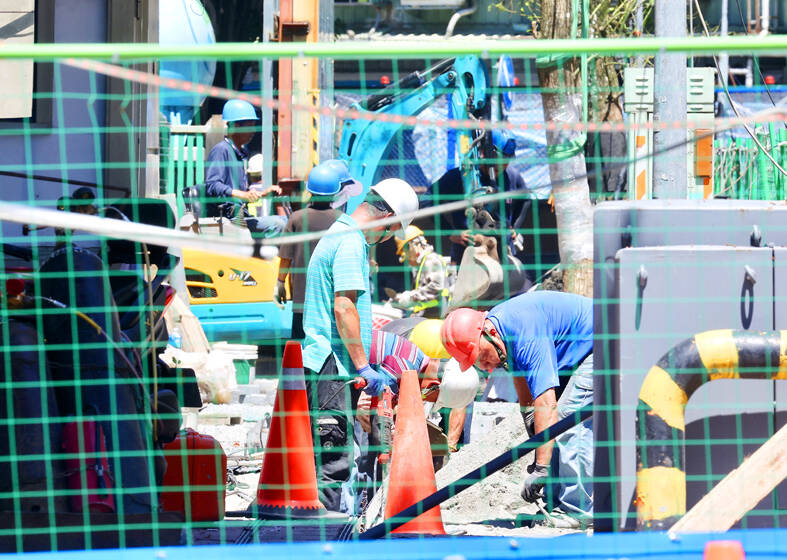Last month’s unemployment rate edged up to 3.4 percent, the highest in nine months, due to an influx of new graduates and students seeking summer jobs, the Directorate-General of Budget, Accounting and Statistics (DGBAS) said yesterday.
The number of unemployed people climbed by 5,000 from June to 409,000, with first-time jobseekers accounting for the largest increase, DGBAS Census Department Deputy Director Tan Wen-ling (譚文玲) told a news briefing in Taipei.
“The uptick in the unemployment rate was driven by multiple factors, including fresh graduates entering the workforce and students looking for summer jobs,” Tan said.

Photo: CNA
Despite the increase, labor officials said the job market remained stable.
Compared with a year earlier, the unemployment rate slid 0.05 percentage points, reaching the lowest level for July in 25 years.
After seasonal adjustments, the jobless rate dipped 0.01 percentage points to 3.33 percent.
The number of underemployed workers — defined as those working fewer hours than they desire — rose slightly to 117,000, up 6,000 or 5.52 percent from the previous month, the agency said.
The figures remain moderate, but warrant close monitoring, Tan said.
Average unemployment duration shortened to 19.1 weeks, falling by 1.1 weeks from June, it said.
First-time jobseekers were unemployed for an average of 14 weeks, down 2.3 weeks, while repeat job seekers saw their average unemployment period decline by 0.6 weeks to 20.7 weeks.
By education level, university graduates posted the highest unemployment rate at 4.63 percent, followed by senior-high school and vocational-school graduates at 3.06 percent, and those with postgraduate degrees at 2.90 percent.
By age group, young workers faced the toughest challenges. Unemployment was 11.91 percent for those aged 20 to 24 and 9.89 percent for those aged 15 to 19, mainly first-time jobseekers entering the workforce during graduation season, the DGBAS said.
The rate was 6 percent for the 25-to-29 age group and 3.44 percent for people aged 30 to 34, the agency said.
Taiwan’s jobless rate compared favorably with some regional peers, such as Hong Kong’s 3.8 percent, but was higher than others, such as Japan’s 2.5 percent and South Korea’s 2.4 percent, DGBAS data showed.
It is still too early to measure the effects of US tariffs on Taiwanese goods, Tan said, as the levies only took effect this month and have not yet appeared in last month’s data.
Economists have cautioned that headline unemployment could understate underlying weakness, which might first emerge through unpaid leave and shorter working hours.
Industries such as machine tools, auto parts, metals and bicycles are expected to bear the brunt of the new tariffs, while technology companies tied to the global supply chain for artificial intelligence hardware are likely to continue benefiting from robust demand, analysts said.

Taiwan Semiconductor Manufacturing Co (TSMC, 台積電), the world’s biggest contract chipmaker, booked its first-ever profit from its Arizona subsidiary in the first half of this year, four years after operations began, a company financial statement showed. Wholly owned by TSMC, the Arizona unit contributed NT$4.52 billion (US$150.1 million) in net profit, compared with a loss of NT$4.34 billion a year earlier, the statement showed. The company attributed the turnaround to strong market demand and high factory utilization. The Arizona unit counts Apple Inc, Nvidia Corp and Advanced Micro Devices Inc among its major customers. The firm’s first fab in Arizona began high-volume production

VOTE OF CONFIDENCE: The Japanese company is adding Intel to an investment portfolio that includes artificial intelligence linchpins Nvidia Corp and TSMC Softbank Group Corp agreed to buy US$2 billion of Intel Corp stock, a surprise deal to shore up a struggling US name while boosting its own chip ambitions. The Japanese company, which is adding Intel to an investment portfolio that includes artificial intelligence (AI) linchpins Nvidia Corp and Taiwan Semiconductor Manufacturing Co (TSMC, 台積電), is to pay US$23 a share — a small discount to Intel’s last close. Shares of the US chipmaker, which would issue new stock to Softbank, surged more than 5 percent in after-hours trading. Softbank’s stock fell as much as 5.4 percent on Tuesday in Tokyo, its

COLLABORATION: Softbank would supply manufacturing gear to the factory, and a joint venture would make AI data center equipment, Young Liu said Hon Hai Precision Industry Co (鴻海精密) would operate a US factory owned by Softbank Group Corp, setting up what is in the running to be the first manufacturing site in the Japanese company’s US$500 billion Stargate venture with OpenAI and Oracle Corp. Softbank is acquiring Hon Hai’s electric-vehicle plant in Ohio, but the Taiwanese company would continue to run the complex after turning it into an artificial intelligence (AI) server production plant, Hon Hai chairman Young Liu (劉揚偉) said yesterday. Softbank would supply manufacturing gear to the factory, and a joint venture between the two companies would make AI data

The Taiwan Automation Intelligence and Robot Show, which is to be held from Wednesday to Saturday at the Taipei Nangang Exhibition Center, would showcase the latest in artificial intelligence (AI)-driven robotics and automation technologies, the organizer said yesterday. The event would highlight applications in smart manufacturing, as well as information and communications technology, the Taiwan Automation Intelligence and Robotics Association said. More than 1,000 companies are to display innovations in semiconductors, electromechanics, industrial automation and intelligent manufacturing, it said in a news release. Visitors can explore automated guided vehicles, 3D machine vision systems and AI-powered applications at the show, along